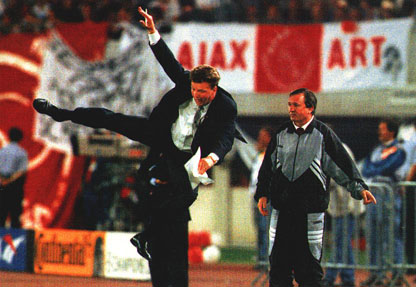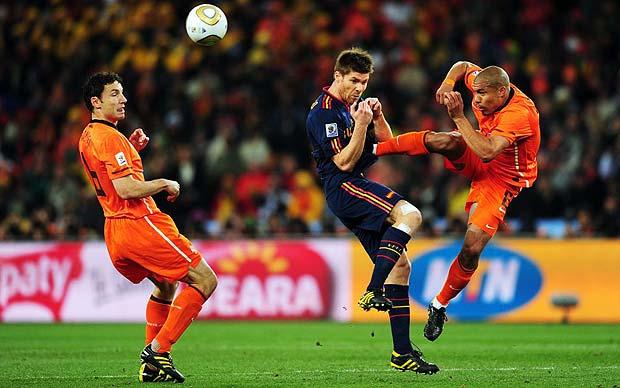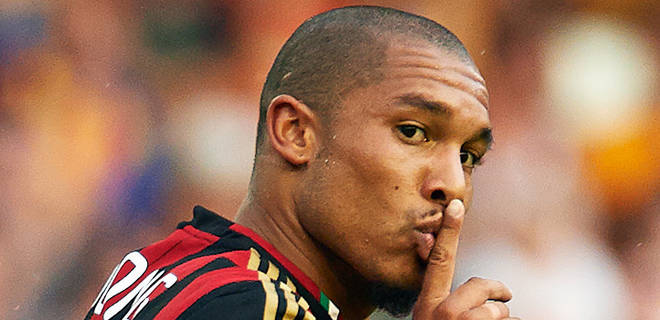New PSV trainer Phillip Cocu talks as the Barca or Ajax coach. “Play dominant football, forward pressure and take the initiative.” He needed different center backs in his team to play this way. Jeffrey Bruma (21) and Karim Rekik (18) have settled in nicely. Bruma was bought from Chelsea (but the London club negotiated the right of first refusal) and Rekik is on loan from Man City. They are young. Very young. But very confident: “It’s not about age, but about quality.”
It seems as if all the new players have settled in nicely at PSV?
Bruma: “I think so. The people here at PSV have done an awesome job. The lads that were here helped us a lot too. It makes all the difference.”
Rekik: “The fun thing is, most lads I know from the youth games with Feyenoord. And Gini Wijnaldum played higher than me at Feyenoord of course but we knew each other. Some lads, I have known for years and are good mates, like Depay, Willems and Brenet. That made it easier for me to settle in.”
Bruma: “Same for me. I played with Zoet, Maher, Narsingh, Locadia and Wijnaldum in the Oranje selections and with Schaars I played too, in the big Oranje and I also know Cocu and Faber from those days. And Karim and I know each other for years too.”
Really?
Rekik: “I played for years with Kyle Ebicilio, who is now at FC Twente. He is a very good mate. And he is Jeffrey’s cousin. Our families know each other really well and we even went on holidays together. I remember you left for Chelsea that particular summer.”
Bruma: “It’s quite special to be playing with Karim now, thinking about that particular summer. We couldn’t have made that up back then, hahaha.”
Rekik: “We do share the same management (Rodger Linse) and through them I heard pretty early on that PSV wanted us both.”
There is quite some good football in your families…
Bruma: “My dad was a good athlete. A long distance runner. My mum played different sports. Fabian Wilnis is my uncle, who played for NAC and Ipswich Town. My brother Marciano played for Sparta, Barnsley and Lech Poznan. He is now my manager. And Kyle Ebicilio is my cousin. We all love sports.”
Rekik: “My little brother Omar, 11 years old, plays for Man City as well. He is regarded to be one of the biggest talents they have. He is in the elite group, for whom special arrangements for school are made. They attend this very expensive school and the club pays for it all. I’m so proud of him. I think we have the talent from my dad. He played pro football in Tunesia. My dad didn’t have long career as a knee injury made him stop. He studied hard instead and came to Holland to pursue a career. But from the day we could walk, he was always playing football with us.”
Karim Rekik got introduced to the Islam via his dad, but his little brother inspired him to practice the faith. “Our dad leaves us free in this, but my kid brother got interested in it and we went and checked this mosque out and it did something to me. I do it my way though. I don’t get involved in ramadan as I don’t believe I can combine it with my football. But I do it on days off. I do pray 5 times a day and on Friday’s I go to the mosque. And I want to visit Mekka one day.
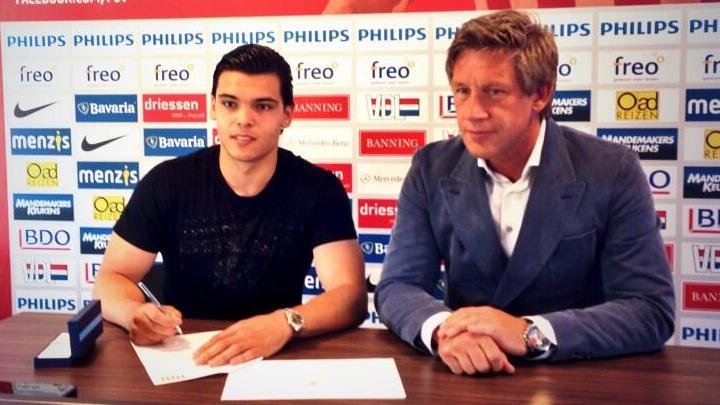
You both went to England when you were 16 years old. And now you are playing for PSV. Criticasters will say: see, you made a bad decision.
Bruma: “I don’t think you can make general comments like that. Every player is different. I totally believe I made the right decision. I have played and trained with some of the best in the game. I have played in England and Germany and I’m only 21 years old.”
But you could have played in the Feyenoord first team for 4 seasons?
Bruma: “Yeah but who knows. You don’t know this for sure.”
Rekik: “It’s really not relevant to talk about this, is it? It is all “I could have or should have…” You make a decision and you go with it. I think I have not made a bad decision.”
And the money?
Rekik: “I have not made my decision to leave for Man City on the basis of money. I could actually go to different clubs, one Italian club in particular, was offering me much more. My first contract with Man City was an apprentice contract. I was paid 570 euro per month and they gave us a rental house. I now have a real contract of course, but you do have to earn that.”
Bruma: “I did it for the challenge. I wanted to know if I was going to be good enough for Chelsea. I have not been paid to well either, in the beginning. After two years in London, I played 10 games in Chelsea 1. I played Champions League. I am proud of that.”
Is it hard to leave a top club?
Bruma: “For sure. Every day you become better, when you train with the likes of Terry and Lampard. When you play with only top players, you are lifted up and get into this flow. If players like Terry, or Kompany in Karim’s case, help you and guide you, you feel special. It does something….”
Man City has a lot of faith in Rekik. The youngster will be scouted every match. “I know they will come and watch me play all the time. This is how they work. They prepare reports and keep track. There is a whole department for this. And they do evaluations periodically. I like it. It is clear that they take me and the others seriously.
But young players in England do not have any say in where they play, right?
Bruma: “Wrong. I have played on loan at Leicester and HSV Hamburg and this has always been after consultation with me. Chelsea wouldn’t force a player.”
Rekik: “Same here. Everytime I got loaned out, it was either because I took the initiative or because we both decided it was best. PSV is my third club. I played eight games for Portsmouth and later on I went to Blackburn Rovers.”
How did the PSV deal go?
Rekik: “Manager Marcel Brands first checked with Rodger Linse whether I would be interested. Rodger talked to my parents and and me. I was very happy to give it a go. So Rodger talked to Man City we all felt it was a good move for me. I spoke to Nigel de Jong about it too. He has become a dear friend and I talk to him a lot about these things. He’s my mentor. And he thought it would be very good for me.”
And you decided to leave Chelsea, Jeffrey?
Bruma: “Well, there was a new deal for me, at Chelsea. They didn’t want to see me go and I could be part of the squad now. But I wouldn’t be playing a lot. I would be a player for the future and I would get time in the Carling Cup or something…. I did think about it but I decided I am beyond a player for the future. I am a player for now. I am young, fit and I have learned a lot at Chelsea and HSV. I want to play every week. I had more options, but PSV was the right club for me.”
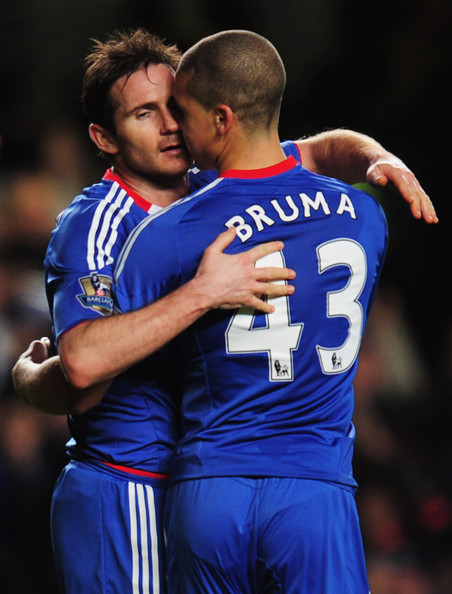
Lampard opposed to the tongue
But it didn’t work out really well at Hamburger SV?
Bruma: “I played a lot in my first season. It was a season of ups and downs, I have to say. We played relegation football almost. Very challenging. The second season, I became victim of a new policy at HSV. They wanted to use players with long-term contracts. The coach even told me I was his preferred option for center back, but the board wanted to use players who would be loyal to the club. I did understand their point, but it was disappointing for me of course. They wanted to sign me and make me one of their own, but they couldn’t get it together, financially. I still played 20 games last season. I wasn’t used to playing under that kind of pressure, to be honest. Relegation football… Also, HSV has never been relegated so playing with that potential outcome put extra pressure on. It was not easy.”
So returning to Chelsea was not what you were looking out for?
Bruma: “No, I didn’t want spend time on the bench there, with all due respect. I didn’t want to be in a situation where Chelsea would again loan me out to a relegation candidate. I wanted to take my career in my own hands.”
Jeffrey Bruma and Christianity: the former Chelsea man – son of a Dutch father and a Suriname mother – is a very religious young man. It was key in his upbringing and still is a factor. “I can go to church once a week again, in Rotterdam. I missed that a bit. In England and Germany I prayed with my mum and we watched services on telly or we read the Bible together. It’s a very cool congretation. Lots of music and singing. It takes 2,5 hours and then the cooks prepare food. It relaxes me. The older I get, the more important my faith becomes. My mum took me when I was young, but now I can determine myself whether I embrace it or not. And I do….
The Eredivisie has become a popular destination for young players. Look at Ajax, Feyenoord, AZ, Twente… Age is not a factor, it seems.
Rekik: “The meetings I had with PSV management were key for me. Marcel Brands and Phillip Cocu gave me a very warm feeling. I was on holiday in Holland and Cocu dropped in and we talked about me, my style of play, my career and his analysis of me told me he had really spent time on me. He gave me tremendous confidence and it was clear that he really wanted me in his team. I could also go to another club in England and a club in Spain. But I did want to play in the Eredivisie. I believe in Cocu as coach and the football played in Holland is befitting of my style.”
Bruma: “For me, it was important to play in Holland. Young players get more chances here. And the play is more open. Like Karim says, Brands and Cocu knew everything about me and my background. I did my homework too and when I learned about the signings and the ambitions here, I didn’t need much time to decide.”
You are both young, but play with the confidence of experienced players.
Rekik: “I hear that comment already a long time. I have always been skipper of teams and I always here that I resonate authority and confidence. And I worked on that with a vengeance. When I first played at City, I thought I couldn’t play football anymore. Every ball was taken away from me. I lost every challenge. And a loose ball, man…you’d see Kompany running towards me and I would simply pull back. I needed to work out. Get stronger. I got this personal program and started to work in the gym, to gain strength.”
What does Cocu, your coach, expect from you?
Rekik: “He wants us to be fearless. In defensive sense and in offensive sense. He wants the team to dominate, to control the pitch and the ball. We can do this.”
Bruma: “He wants us to play our own game. Karim and I have a click together, that always helps. I trust Karim, so I can take a bit more initiative and vice versa. He basically wins all his duels, did you see that?”
Rekik: “And when Jeff commits to a duel, I back him up. We are both pretty content with how we are doing and that is not something I easily am.”
You are relatively inexperienced, but you both ooze confidence.
Rekik: “There is no need to be anxious or nervous on the ball. You have to have faith in your skills. We both always were confident on the ball, which doesn’t mean we never make a stupid mistake, hahaha.”
Jeffrey Bruma’s transfer to PSV was a bit delayed due to alleged heart issues. “I wasn’t surprised,” Bruma says. “I have a thick heart muscle. What they call a sports heart. Chelsea knew this too, they found out when I was 16 years old. It is not a problem. PSV knew this too. For my medical though, they wanted to use the same doctor I have consulted for years in London and the good man was on a summer break, hence the delay. If he wasn’t away, it would have been settled on that same day and no one would have cared.”
Has England changed you or are you still typical Dutch defenders: good in build up, trying to take initiative?
Rekik: “That will always be part of our game of course. But the time in England has taught us to be killers too. As a defender, your first task is to defend.”
Bruma: “True. My development at Feyenoord as a defender was great, but always aimed at ball possession. In England I have learned what it is to battle. Practice in England and Germany were normally tougher than the games. Flying tackles like razorblades man.”
Rekik: “Coach Cocu demands this from us on practice too. He wants to see 100% commitment.”
Bruma: “He always says “being a nice guy won’t win you titles”….
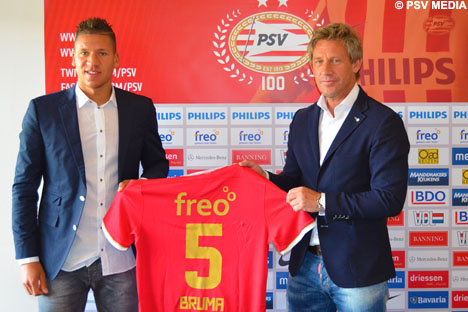
The football world is taking notice of this PSV. With lots of scouts on the stands, as a result.
Bruma: “Cool. But, we played only 4 or 5 games. Too early to pass judgement. We should not think we are “there”. Because then it will go south really quickly.”
Rekik: “We do notice the response from the crowd. That always helps us improve too. So there is that interaction.”
You were the youngest PSV ever in the Zulte Waregem games.
Rekik: “It’s pretty cool to be part of that. Some people believe young people can’t be consistent. I don’t buy it.”
Jeffrey, Chelsea has negotiated a buy back option for 5 Mio Euros. Does that go through your mind?
Bruma: “I know they demanded that. But it’s not a topic for me.”
Karim, how is that for you?
Rekik: “I am now focusing on PSV. My deal with Man City is till 2017. They have faith in me, but this season it’s all PSV for me. As a player in a top club you need to live day by day. I don’t want to think about next season.”
What are your personal goals?
Bruma: “I want to play as many games as possible and play well. The coach wants me to take charge and lead. And that is what I want to do. I want to win silverware. We want to have a serious go at the title.”
Rekik: “Me too.”
Bruma: “And stay realistic. Keep our feet firmly on the ground.”

